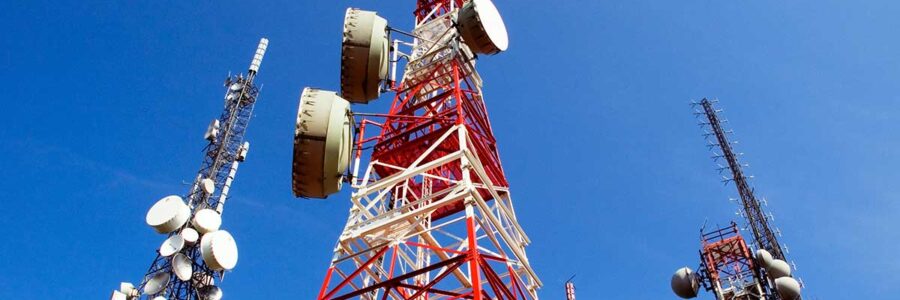In the age of constant connectivity, we’re surrounded by technology that keeps us always linked to the world. Cell towers are a critical part of this infrastructure, enabling everything from phone calls to internet browsing. But while these towers provide us the convenience of staying connected, they may also disrupt something more essential—our sleep.
Electromagnetic fields (EMFs) emitted by cell towers are increasingly scrutinized for their potential impact on health. While the long-term risks of EMF exposure, such as cancer, often make headlines, the more immediate effects—like interference with sleep—are equally concerning but less commonly discussed. In this post, we’ll explore how EMFs from cell towers can affect your sleep, why this is a significant issue, and how to protect yourself.
What Are EMFs and Why Should You Care?
Electromagnetic fields (EMFs) are invisible areas of energy, often associated with electrical power and various forms of natural and artificial lighting. These fields are emitted by multiple devices, including cell towers, Wi-Fi routers, and even household appliances.[1]
EMFs are generally divided into non-ionizing (low-frequency) and ionizing (high-frequency). While high-frequency radiation, such as that from X-rays, is known to pose serious health risks, low-frequency radiation from sources like cell towers has long been considered less harmful. However, emerging research suggests that even low-frequency EMFs can have detrimental effects, especially with prolonged exposure.[2]
How EMFs from Cell Towers Disrupt Sleep
Sleep is one of the most critical aspects of overall health, affecting everything from mood to immune function. However, EMFs, particularly those emitted by cell towers, can disrupt sleep by interfering with the brain’s natural rhythms.
EMFs can impact melatonin production, the hormone regulating your sleep-wake cycle. When melatonin levels are disrupted, it can lead to difficulty falling asleep, staying asleep, and achieving the deep sleep stages necessary for full rest and recovery. The result is poor sleep quality, which can lead to chronic sleep deprivation and a host of associated health problems.[3]
Beyond sleep disruption, there’s growing evidence linking EMF exposure to various cognitive and neurological issues, including ADHD, autism spectrum disorders, and Alzheimer’s disease. Long-term exposure to EMFs has also been associated with an increased risk of developing certain types of cancer.[4]
A Personal Case Study: High EMF Levels in a Hotel Room
I recently encountered the effects of high EMF exposure firsthand while staying at a hotel surrounded by cell towers. After a night of disturbed sleep, I measured the EMF levels in my room. The results were alarming: the meter showed as high as 20,000 microwatts per meter squared. Experts recommend that safe exposure levels should not exceed 0.010 microwatts per meter squared for comparison.
Even more concerning is that many countries with stricter EMF regulations would consider these levels illegal. No wonder the severe impact on my sleep.
Steps You Can Take to Reduce EMF Exposure
While you might not be able to avoid EMF exposure entirely, there are several steps you can take to minimize it, particularly in environments where you sleep:
- Location Matters: When choosing a home, office, or hotel, consider the proximity of cell towers. Various online tools and apps can help you determine how close you are to these EMF sources.
- Invest in EMF Protection: There are products available that can help shield you from EMFs, such as specialized fabrics, bed canopies, and window coverings. These can be particularly useful if you’re in a high-EMF area.
- Power Down at Night: Reduce your overall EMF exposure by turning off electronic devices, especially at night. This includes Wi-Fi routers, cell phones, and other gadgets that emit EMFs.
- Consider Grounding: Using grounding mats or sheets can help neutralize EMFs and improve sleep quality by connecting your body to the earth’s natural energy.
- Visual Inspection: If you don’t have access to an EMF meter, you can look out the window to see if you’re near any cell towers or antennas. Spotting one likely exposes you to higher levels of EMFs, affecting your sleep quality.
Why Sleep Disruption from EMFs Shouldn’t Be Ignored
Sleep is foundational to health, influencing everything from cognitive function to physical recovery. Disrupted sleep can lead to a cascade of health issues, including decreased immunity, poor mental health, and increased risk of chronic conditions. In a world where EMF exposure is almost unavoidable, especially in urban areas, it’s crucial to minimize risk.
While the convenience of technology is undeniable, it’s important to recognize that it can come with hidden costs. By reducing your exposure to EMFs—particularly in environments where you sleep—you can protect your health and ensure that you’re getting the quality rest your body needs to function at its best.
In summary, while cell towers and the EMFs they emit are integral to modern life, they may be compromising your sleep and, by extension, your overall health. By understanding the risks and implementing simple protective measures, you can take control of your environment and prioritize your well-being. Remember, your health is worth it, and ensuring a good night’s sleep is key to maintaining a non-toxic lifestyle.
References:
- Electric and Magnetic Fields.” National Institute of Environmental Health Sciences.
- V), National Research Council (US) Committee on the Biological Effects of Ionizing Radiation (BEIR. “Genetic Effects of Radiation.” Health Effects of Exposure to Low Levels of Ionizing Radiation: Beir V, National Academies Press (US), 1990.
- Kim, Ju Hwan, et al. “Possible Effects of Radiofrequency Electromagnetic Field Exposure on Central Nerve System.” Biomolecules & Therapeutics, vol. 27, no. 3, May 2019, pp. 265–75. PubMed Central.
- Kim, Ju Hwan, et al. “Possible Effects of Radiofrequency Electromagnetic Field Exposure on Central Nerve System.” Biomolecules & Therapeutics, vol. 27, no. 3, May 2019, pp. 265–75. PubMed Central.


